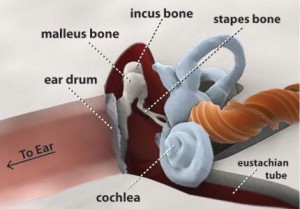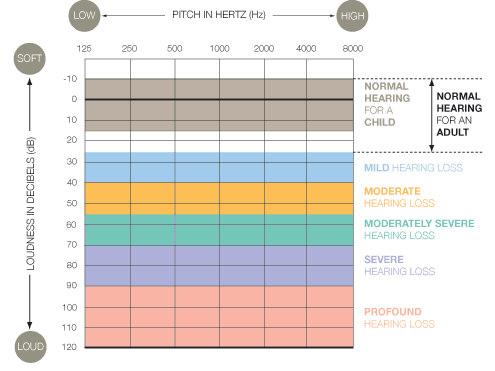How do I know if I have Hearing Loss?
Hearing loss can occur at any age for a variety of reasons. Most often hearing loss occurs as a combination of causes, such as
- exposure to loud noise
- family history of hearing loss
- certain medications
- natural aging
- infections and disease specific to the ears
- head or ear trauma
It is estimated that 34 million people in America have some degree of permanent hearing loss. Hearing loss is the single most common medical disorder at birth while hearing loss in adults is one of the most common health issues.
You may have hearing loss if…
- You hear the voice but misunderstand the words.
- You frequently ask people to repeat what they said.
- You ask for people to repeat words or phrases.
- You feel many people mumble.
- You understand people more clearly if you can see them.
- You need to ask others about the details of a speech or presentation you just heard.
- You play the TV or radio louder than your friends, spouse and relatives.
- You cannot hear household ringing or beeping sounds like the microwave, doorbell, or telephone.
Types of Hearing Loss
There are two main types of hearing loss, Sensorineural and Conductive. Also, auditory processing changes can greatly affect word understanding along with sensorineural hearing loss.
Sensorineural
Sensorineural refers to the most common type of hearing loss. The tiny hearing hair cell receptors in the inner ear are not as sensitive as they used to be. This commonly occurs from:
- A natural change from aging or family history of hearing loss
- Damage caused by loud sound or noise exposure – even if that exposure occurred many years ago. The hair cell receptors are damaged at the time of exposure but may not show as hearing loss until many years later.
- Disease or infection in the inner ear may result in a sensorineural hearing loss in 5-10% of people. There are usually other symptoms that lead us to this diagnosis.
85% of people with hearing loss have sensorineural hearing loss. This type cannot be corrected with medication or surgery. Appropriate hearing aids are the best way to improve your hearing and regain understanding.
Conductive
Conductive hearing loss is caused by conditions with your eardrum, middle ear, or middle ear bones. These structures vibrate and anything that limits the vibration can prevent the sound from entering the inner ear at full strength. Conductive hearing loss can be caused by:
- Hardening of the eardrum from scar tissue
- Hole in the eardrum
- Middle ear fluid or infection
- Stiffening of the middle ear bones – called Otosclerosis.
Conductive hearing loss can frequently be corrected with medication and/or surgery. If you have this hearing loss we may be referring you to an Otologist, a physician specializing in treatment and surgery of the ear.
If you are not a candidate for treatment or surgery, hearing aids are very effective in improving conductive hearing loss.
Auditory Processing Deficits
An Auditory Processing Deficit is not a type of hearing loss but is a condition caused by changes in the processing and understanding centers within the brain. All meaning of sound is interpreted inside the brain and this may change so the brain is not able to accurately decipher sounds to make them understandable words. Auditory Processing Deficits may result from:
- Longstanding, untreated hearing loss
- Diseases such as dementia and Alzheimers disease greatly effect brain processing.
- Age related changes to concentration, listening, and attention.
- Other central influences like stroke and vascular problems.
- Progressive neurologic disease like multiple sclerosis
This problem may occur with normal hearing but is also more common with hearing loss. The understanding centers in the brain are not reacting to sound as quickly or as accurately so it looks like the person “can’t hear”. It is most frequent in the elderly and is very common in those who have an untreated hearing loss for many years. Your processing clarity is likely to improve through a combination of hearing aids and improved listening habits. Sometimes auditory therapy can strengthen meaningful processing abilities.
Degrees of Hearing Loss
The amount of hearing loss is measured by its degree: normal, mild, moderate, moderately severe, severe, and profound. It is important to understand that people with hearing loss of any degree report the same symptom – “I hear pretty well, I just don’t understand all the words as clear as I used to”. This is the first and most common sign of hearing loss.

The graph above, an audiogram, shows the degree of hearing loss down the right side.
Mild hearing loss starts making it difficult to understand some speech in specific situations, such as with a soft speaker or when listening in background noise. In quiet rooms, a mild hearing loss causes very little problem.
Moderate hearing loss creates more problems understanding conversations, particularly when listening to softer voices and people who seem to talk fast.This is particularly noticeable in background noise such as restaurants or social gatherings. The TV or radio may be somewhat louder for some programs in order to be heard clearly. Others may notice your hearing problem before you do. Hearing aids are very helpful when used at this level.
Moderately-severe hearing loss is obviously noticeable to others because you’ve lost half your hearing. Clarity of speech is affected whether in quiet or busy gatherings, causing you to misunderstand words and need repeats. The punch lines to jokes are much harder to understand. Others complain that the TV is too loud and hearing people from a distance becomes more difficult. Family members and coworkers are aware of your hearing problem and often complain about it. In an elderly person, they often do not realize that they have lost half of their hearing and begin to withdraw without even noticing. Hearing aids are incredibly helpful at this level.
Severe hearing loss requires people to speak directly to you with a louder voice. All communication must be direct and purposeful. Often you will need to watch the speaker in order to understand. Usually, the hearing loss has been present for years and has finally reached this level where communication is no longer easy or enjoyable. Oddly enough the person is aware of some hearing problem but has no reference for what they are missing; they are still reluctant to do something about it. Hearing aids are vital at this stage to remain engaged with the communication around you. If the person has never used hearing aids they must be guided carefully to achieve the best possible hearing over a period of months.
Profound Hearing loss creates pervasive hearing problems for almost all daily sounds. At this level, people with profound hearing loss may have difficulty understanding even amplified speech. Hearing aids or other amplification is vital to remain connected to the hearing world around you.
What if I delay treatment for my hearing improvement?
Often people resist any examination or treatment of hearing difficulty until it reaches the moderate range – about 50% hearing loss. At this point, it creates daily frustration in several listening environments. Older people in particular often wait until the hearing problem extends into the severe category. They finally resign themselves to seeking help when their hearing problem becomes pervasive. Often it is too late to regain optimal understanding because the decline has persisted for far too long and changes in neural pathways have occurred. Had they responded earlier to the hearing problem the improvement would have been more obvious, easier to adjust to, and would likely have prevented some of the further hearing difficulty.
When Should I have My Hearing Evaluated?
A good rule of thumb is to seek treatment when any of the following occur:
- Family members begin commenting about your hearing difficulty. Even a joke can be a gentle prod for you to recognize the emerging problem.
- When you find that a growing number of people seem to “mumble”. It is easy to blame others for their poor speaking habits when it’s likely your hearing. If other listeners around you seem to understand the speaker then it’s likely your hearing, not their speaking.
- When you rely on watching people as they speak. We use our eyes to augment what our ears have stopped doing. If you understand noticeably better when watching someone, it’s time to have your hearing checked.
- When background noise interferes with your ease of listening. An obvious sign of hearing loss is when your hearing seems satisfactory in quiet situations but is obviously more frustrating when in crowded rooms like restaurants and other busy gatherings. It is easy to dismiss this as simply a problem with the crowd, or the room, or the speaker – when it is likely related to your hearing.
- When you start dropping out of conversations because it requires too much effort, or you avoid challenging listening situations altogether – it’s time for a hearing evaluation. Isolation is a common effect of untreated hearing loss and usually starts as withdrawal from specific situations – “I’m not going to church anymore because I just can’t hear anyone”.
It is vital that family members insist on early diagnosis and treatment when faced with a person who is often reluctant and unbelieving about their hearing problem.


